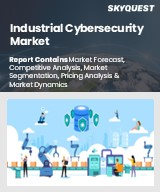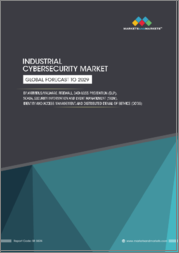
|
시장보고서
상품코드
1675616
산업용 사이버 보안 시장 : 컴포넌트별, 보안 유형별, 산업별, 지역별(2025-2033년)Industrial Cybersecurity Market by Component (Product, Solutions and Services), Security Type (Network Security, Cloud Application Security, End-Point Security, Internet Security, and Others), Industry (Process, Discrete), and Region 2025-2033 |
||||||
산업 사이버 보안 세계 시장 규모는 2024년 190억 달러에 달했습니다. 향후 IMARC Group은 이 시장이 2033년까지 328억 달러에 달하고, 2025-2033년 6.24%의 연평균 성장률(CAGR)을 나타낼 것으로 예상하고 있습니다. 주요 인프라에 대한 사이버 공격 발생률 증가, 클라우드 기반 솔루션에 대한 수요 증가, 고급 사이버 보안 솔루션 시장 개척, 인공지능(AI) 및 머신러닝(ML) 기술 활용 등이 시장을 이끄는 주요 요인으로 꼽힙니다.
산업용 사이버 보안은 산업용 제어 시스템(ICS) 및 중요 자산을 사이버 위협으로부터 보호하는 것을 말합니다. 여기에는 액세스 제어, 네트워크 보안, 엔드포인트 보호, 사고 감지 및 대응, 취약점 관리, 모니터링, 데이터 보안 등 다양한 보안 조치의 실행이 포함됩니다. 산업용 사이버 보안은 송배전 라인, 제조 공장, 자동화 시스템, 의료 인프라, 통신 네트워크, 국방 생산 시설, 중요 시설, 운송 시스템 보호에 널리 활용되고 있습니다. 안전하고 신뢰할 수 있는 산업 운영을 보장하고, 안전한 통신을 제공하며, 잠재적인 혼란, 무단 액세스, 데이터 침해, 방해 행위를 방지합니다. 또한 취약성을 완화하고, 적절한 보안 관리를 보장하고, 국가 안보 이익을 보호하고, 산업 사고를 예방하는 데 도움이 됩니다. 그 결과, 산업 사이버 보안은 자동차, 운송, 항공우주, 방위, 화학, 석유 및 가스, 제조, 통신 등의 산업에서 광범위하게 적용되고 있습니다.
산업 사이버 보안 시장 동향 :
중요 인프라에 대한 사이버 공격과 위협 증가는 시장 성장을 가속하는 주요 요인 중 하나입니다. 산업용 사이버 보안은 전력망, 교통 시스템, 정수장, 의료 시설 등 다양한 중요 인프라를 악성코드, 랜섬웨어, 데이터 침해, 방해공작 시도로부터 보호하기 위해 널리 사용되고 있습니다. 또한, 업무 효율성 향상을 위한 사물인터넷(IIoT) 디바이스의 급속한 확산은 상호 연결된 디바이스를 보호하고 원활한 통신을 가능하게 하는 견고한 산업용 사이버 보안 솔루션에 대한 수요를 촉진하고 있습니다. 이와는 별도로 확장성 향상, 접근성, 보안, 자동 업데이트, 재해 복구, 실시간 데이터 처리 등 여러 가지 이점을 제공하는 클라우드 기반 솔루션에 대한 수요가 증가하면서 시장 성장을 가속하고 있습니다. 또한, 위협 감지 및 대응 강화, 이상 징후 식별, 사이버 보안 조치 자동화를 위한 인공지능(AI) 및 머신러닝(ML) 기술의 활용은 대응 시간 단축과 전반적인 보안 효과 향상을 지원하여 시장 성장을 강화하고 있습니다. 이와 더불어, 중요한 거래, 공급망 업무, 데이터 공유의 보안을 강화하기 위한 블록체인 기술의 채택이 시장 성장에 긍정적인 영향을 미치고 있습니다. 또한, 산업계의 사이버 보안 솔루션 채택을 촉진하고 국가 경제에 중요한 핵심 인프라의 보안을 강화하기 위한 엄격한 정부 규제의 시행이 시장 성장을 뒷받침하고 있습니다. 기타 요인으로는 급속한 디지털화 활동, 첨단 사이버 보안 솔루션 개발에 대한 투자 증가, 사이버 위협의 악영향에 대한 인식 증가 등이 시장 성장을 가속할 것으로 예상됩니다.
본 보고서에서 다룬 주요 질문
- 산업 사이버 보안 시장 규모는?
- 산업 사이버 보안 시장 전망은?
- 산업 사이버 보안 시장을 이끄는 주요 요인은?
- 산업 사이버 보안 시장 점유율이 가장 높은 지역은 어디일까?
- 세계 산업 사이버 보안 시장의 주요 기업은?
목차
제1장 서문
제2장 조사 범위와 조사 방법
- 조사 목적
- 이해관계자
- 데이터 소스
- 1차 정보
- 2차 정보
- 시장 추정
- 보텀업 접근
- 톱다운 접근
- 조사 방법
제3장 주요 요약
제4장 서론
- 개요
- 주요 업계 동향
제5장 세계의 산업용 사이버 보안 시장
- 시장 개요
- 시장 실적
- COVID-19의 영향
- 시장 예측
제6장 시장 분석 : 구성요소별
- 제품
- 솔루션 및 서비스
제7장 시장 분석 : 보안 유형별
- 네트워크 보안
- 클라우드 애플리케이션 보안
- 엔드포인트 보안
- 인터넷 보안
- 기타
제8장 시장 분석 : 산업별
- 프로세스
- 주요 유형
- 석유 및 가스
- 화학제품
- 식품 및 음료
- 에너지 및 전력
- 기타
- 주요 유형
- 디스크리트
- 주요 유형
- 자동차
- 일렉트로닉스
- 중공업
- 포장
- 기타
- 주요 유형
제9장 시장 분석 : 지역별
- 북미
- 미국
- 캐나다
- 아시아태평양
- 중국
- 일본
- 인도
- 한국
- 호주
- 인도네시아
- 기타
- 유럽
- 독일
- 프랑스
- 영국
- 이탈리아
- 스페인
- 러시아
- 기타
- 라틴아메리카
- 브라질
- 멕시코
- 기타
- 중동 및 아프리카
- 시장 분석 : 국가별
제10장 성장 촉진요인 및 억제요인과 기회
- 개요
- 성장 촉진요인
- 성장 억제요인
- 기회
제11장 밸류체인 분석
제12장 Porter의 Five Forces 분석
- 개요
- 바이어의 교섭력
- 공급 기업의 교섭력
- 경쟁 정도
- 신규 진출업체의 위협
- 대체품의 위협
제13장 가격 분석
제14장 경쟁 구도
- 시장 구조
- 주요 기업
- 주요 기업 개요
- ABB Ltd.
- AO Kaspersky Lab
- Check Point Software Technologies Ltd.
- Cisco Systems Inc.
- Dell Technologies Inc.
- Honeywell International Inc.
- International Business Machines Corporation
- OPSWAT Inc.
- Proofpoint Inc.
- Rockwell Automation Inc.
- Schneider Electric SE
- Siemens AG
The global industrial cybersecurity market size reached USD 19.0 Billion in 2024. Looking forward, IMARC Group expects the market to reach USD 32.8 Billion by 2033, exhibiting a growth rate (CAGR) of 6.24% during 2025-2033. The rising incidence of cyberattacks against critical infrastructures, growing demand for cloud-based solutions, the development of advanced cybersecurity solutions, and the utilization of artificial intelligence (AI) and machine learning (ML) techniques represent some of the key factors driving the market.
Industrial cybersecurity refers to the protection of industrial control systems (ICS) and critical assets from cyber threats. It involves implementing various security measures, such as access control, network security, endpoint protection, incident detection and response, vulnerability management, monitoring, and data security. Industrial cybersecurity is widely used to safeguard power transmission and distribution lines, manufacturing plants, automation systems, healthcare infrastructure, communication networks, defense production facilities, critical installations, and transportation systems. It ensures safe and reliable industrial operations, provides secure communication, and prevents potential disruptions, unauthorized access, data breaches, and sabotage. It also aids in mitigating vulnerabilities, ensuring appropriate security controls, protecting national security interests, and preventing industrial accidents. As a result, industrial cybersecurity finds extensive applications across the automotive, transportation, aerospace, defense, chemical, oil and gas, manufacturing, and telecommunication industries.
Industrial Cybersecurity Market Trends:
The rising incidence of cyberattacks and threats against critical infrastructures is one of the primary factors propelling the market growth. Industrial cybersecurity is widely used to safeguard various critical infrastructures, such as power grids, transportation systems, water treatment plants, and healthcare facilities, from malware, ransomware, data breaches, and sabotage attempts. Furthermore, the rapid proliferation of the Industrial Internet of Things (IIoT) devices to improve operational efficiency is facilitating the demand for robust industrial cybersecurity solutions to secure interconnected devices and enable seamless communication. Apart from this, the growing demand for cloud-based solutions, which offer several benefits, such as enhanced scalability, accessibility, security, automatic updates, disaster recovery, and real-time data processing, is favoring the market growth. Additionally, the utilization of artificial intelligence (AI) and machine learning (ML) techniques to enhance threat detection and response, identify anomalies, and automate cybersecurity measures, which aid in reducing response time and improving overall security effectiveness, is strengthening the market growth. Besides this, the adoption of blockchain technology to enhance the security of critical transactions, supply chain operations, and data sharing is positively influencing the market growth. Moreover, the implementation of strict government regulations to promote the adoption of cybersecurity solutions among industries and enhance the security of critical infrastructures important for the country's economy is supporting the market growth. Other factors, including rapid digitalization activities, increasing investment in the development of advanced cybersecurity solutions, and growing awareness regarding the adverse effects of cyber threats, are anticipated to drive the market growth.
Key Market Segmentation:
Component Insights:
- Product
- Solutions and Services
Security Type Insights:
- Network Security
- Cloud Application Security
- End-Point Security
- Internet Security
- Others
Industry Insights:
- Process
- Oil and Gas
- Chemical
- Food and Beverages
- Energy and Power
- Others
- Discrete
- Automotive
- Electronics
- Heavy Manufacturing
- Packaging
- Others
Regional Insights:
- North America
- United States
- Canada
- Asia Pacific
- China
- Japan
- India
- South Korea
- Australia
- Indonesia
- Others
- Europe
- Germany
- France
- United Kingdom
- Italy
- Spain
- Russia
- Others
- Latin America
- Brazil
- Mexico
- Others
- Middle East and Africa
- The report has also provided a comprehensive analysis of all the major regional markets, which include North America (the United States and Canada); Asia Pacific (China, Japan, India, South Korea, Australia, Indonesia, and others); Europe (Germany, France, the United Kingdom, Italy, Spain, Russia, and others); Latin America (Brazil, Mexico, and others); and the Middle East and Africa. According to the report, North America was the largest market for industrial cybersecurity. Some of the factors driving the North America industrial cybersecurity market included increasing incidences of cyberattacks, implementation of strict government regulations, and rapid technological advancements.
Competitive Landscape:
- The report has also provided a comprehensive analysis of the competitive landscape in the global industrial cybersecurity market. Detailed profiles of all major companies have been provided. Some of the companies covered include ABB Ltd., AO Kaspersky Lab, Check Point Software Technologies Ltd., Cisco Systems Inc., Dell Technologies Inc., Honeywell International Inc., International Business Machines Corporation, OPSWAT Inc., Proofpoint Inc., Rockwell Automation Inc., Schneider Electric SE, Siemens AG, etc. Kindly note that this only represents a partial list of companies, and the complete list has been provided in the report.
Key Questions Answered in This Report
- 1.How big is the industrial cybersecurity market?
- 2.What is the future outlook of industrial cybersecurity market?
- 3.What are the key factors driving the industrial cybersecurity market?
- 4.Which region accounts for the largest industrial cybersecurity market share?
- 5.Which are the leading companies in the global industrial cybersecurity market?
Table of Contents
1 Preface
2 Scope and Methodology
- 2.1 Objectives of the Study
- 2.2 Stakeholders
- 2.3 Data Sources
- 2.3.1 Primary Sources
- 2.3.2 Secondary Sources
- 2.4 Market Estimation
- 2.4.1 Bottom-Up Approach
- 2.4.2 Top-Down Approach
- 2.5 Forecasting Methodology
3 Executive Summary
4 Introduction
- 4.1 Overview
- 4.2 Key Industry Trends
5 Global Industrial Cybersecurity Market
- 5.1 Market Overview
- 5.2 Market Performance
- 5.3 Impact of COVID-19
- 5.4 Market Forecast
6 Market Breakup by Component
- 6.1 Product
- 6.1.1 Market Trends
- 6.1.2 Market Forecast
- 6.2 Solutions and Services
- 6.2.1 Market Trends
- 6.2.2 Market Forecast
7 Market Breakup by Security Type
- 7.1 Network Security
- 7.1.1 Market Trends
- 7.1.2 Market Forecast
- 7.2 Cloud Application Security
- 7.2.1 Market Trends
- 7.2.2 Market Forecast
- 7.3 End-point Security
- 7.3.1 Market Trends
- 7.3.2 Market Forecast
- 7.4 Internet Security
- 7.4.1 Market Trends
- 7.4.2 Market Forecast
- 7.5 Others
- 7.5.1 Market Trends
- 7.5.2 Market Forecast
8 Market Breakup by Industry
- 8.1 Process
- 8.1.1 Market Trends
- 8.1.2 Major Types
- 8.1.2.1 Oil and Gas
- 8.1.2.2 Chemical
- 8.1.2.3 Food and Beverages
- 8.1.2.4 Energy and Power
- 8.1.2.5 Others
- 8.1.3 Market Forecast
- 8.2 Discrete
- 8.2.1 Market Trends
- 8.2.2 Major Types
- 8.2.2.1 Automotive
- 8.2.2.2 Electronics
- 8.2.2.3 Heavy Manufacturing
- 8.2.2.4 Packaging
- 8.2.2.5 Others
- 8.2.3 Market Forecast
9 Market Breakup by Region
- 9.1 North America
- 9.1.1 United States
- 9.1.1.1 Market Trends
- 9.1.1.2 Market Forecast
- 9.1.2 Canada
- 9.1.2.1 Market Trends
- 9.1.2.2 Market Forecast
- 9.1.1 United States
- 9.2 Asia-Pacific
- 9.2.1 China
- 9.2.1.1 Market Trends
- 9.2.1.2 Market Forecast
- 9.2.2 Japan
- 9.2.2.1 Market Trends
- 9.2.2.2 Market Forecast
- 9.2.3 India
- 9.2.3.1 Market Trends
- 9.2.3.2 Market Forecast
- 9.2.4 South Korea
- 9.2.4.1 Market Trends
- 9.2.4.2 Market Forecast
- 9.2.5 Australia
- 9.2.5.1 Market Trends
- 9.2.5.2 Market Forecast
- 9.2.6 Indonesia
- 9.2.6.1 Market Trends
- 9.2.6.2 Market Forecast
- 9.2.7 Others
- 9.2.7.1 Market Trends
- 9.2.7.2 Market Forecast
- 9.2.1 China
- 9.3 Europe
- 9.3.1 Germany
- 9.3.1.1 Market Trends
- 9.3.1.2 Market Forecast
- 9.3.2 France
- 9.3.2.1 Market Trends
- 9.3.2.2 Market Forecast
- 9.3.3 United Kingdom
- 9.3.3.1 Market Trends
- 9.3.3.2 Market Forecast
- 9.3.4 Italy
- 9.3.4.1 Market Trends
- 9.3.4.2 Market Forecast
- 9.3.5 Spain
- 9.3.5.1 Market Trends
- 9.3.5.2 Market Forecast
- 9.3.6 Russia
- 9.3.6.1 Market Trends
- 9.3.6.2 Market Forecast
- 9.3.7 Others
- 9.3.7.1 Market Trends
- 9.3.7.2 Market Forecast
- 9.3.1 Germany
- 9.4 Latin America
- 9.4.1 Brazil
- 9.4.1.1 Market Trends
- 9.4.1.2 Market Forecast
- 9.4.2 Mexico
- 9.4.2.1 Market Trends
- 9.4.2.2 Market Forecast
- 9.4.3 Others
- 9.4.3.1 Market Trends
- 9.4.3.2 Market Forecast
- 9.4.1 Brazil
- 9.5 Middle East and Africa
- 9.5.1 Market Trends
- 9.5.2 Market Breakup by Country
- 9.5.3 Market Forecast
10 Drivers, Restraints, and Opportunities
- 10.1 Overview
- 10.2 Drivers
- 10.3 Restraints
- 10.4 Opportunities
11 Value Chain Analysis
12 Porters Five Forces Analysis
- 12.1 Overview
- 12.2 Bargaining Power of Buyers
- 12.3 Bargaining Power of Suppliers
- 12.4 Degree of Competition
- 12.5 Threat of New Entrants
- 12.6 Threat of Substitutes
13 Price Analysis
14 Competitive Landscape
- 14.1 Market Structure
- 14.2 Key Players
- 14.3 Profiles of Key Players
- 14.3.1 ABB Ltd.
- 14.3.1.1 Company Overview
- 14.3.1.2 Product Portfolio
- 14.3.1.3 Financials
- 14.3.1.4 SWOT Analysis
- 14.3.2 AO Kaspersky Lab
- 14.3.2.1 Company Overview
- 14.3.2.2 Product Portfolio
- 14.3.3 Check Point Software Technologies Ltd.
- 14.3.3.1 Company Overview
- 14.3.3.2 Product Portfolio
- 14.3.3.3 Financials
- 14.3.3.4 SWOT Analysis
- 14.3.4 Cisco Systems Inc.
- 14.3.4.1 Company Overview
- 14.3.4.2 Product Portfolio
- 14.3.4.3 Financials
- 14.3.4.4 SWOT Analysis
- 14.3.5 Dell Technologies Inc.
- 14.3.5.1 Company Overview
- 14.3.5.2 Product Portfolio
- 14.3.5.3 Financials
- 14.3.5.4 SWOT Analysis
- 14.3.6 Honeywell International Inc.
- 14.3.6.1 Company Overview
- 14.3.6.2 Product Portfolio
- 14.3.6.3 Financials
- 14.3.6.4 SWOT Analysis
- 14.3.7 International Business Machines Corporation
- 14.3.7.1 Company Overview
- 14.3.7.2 Product Portfolio
- 14.3.7.3 Financials
- 14.3.7.4 SWOT Analysis
- 14.3.8 OPSWAT Inc.
- 14.3.8.1 Company Overview
- 14.3.8.2 Product Portfolio
- 14.3.9 Proofpoint Inc.
- 14.3.9.1 Company Overview
- 14.3.9.2 Product Portfolio
- 14.3.10 Rockwell Automation Inc.
- 14.3.10.1 Company Overview
- 14.3.10.2 Product Portfolio
- 14.3.10.3 Financials
- 14.3.10.4 SWOT Analysis
- 14.3.11 Schneider Electric SE
- 14.3.11.1 Company Overview
- 14.3.11.2 Product Portfolio
- 14.3.11.3 Financials
- 14.3.11.4 SWOT Analysis
- 14.3.12 Siemens AG
- 14.3.12.1 Company Overview
- 14.3.12.2 Product Portfolio
- 14.3.12.3 Financials
- 14.3.12.4 SWOT Analysis
- 14.3.1 ABB Ltd.
Kindly note that this only represents a partial list of companies, and the complete list has been provided in the report.



















